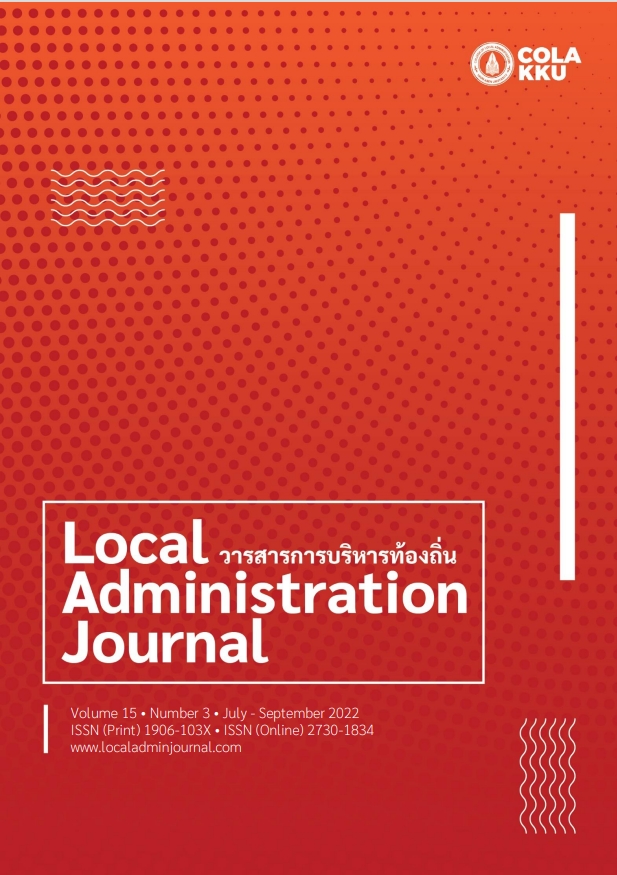Conditions Leading to the Success of Collaborative Governance for Solving Problems of the COVID-19 Crisis: Analysis of the Performance of Two Levels of Local Administrative Organization
Keywords:
Collaborative Governance, the Covid-19 Pandemic, Local Administrative OrganizationAbstract
The purpose of this study was to analyze conditions leading to the success of local administrative organizations using collaborative governance for solving problems of the COVID-19 crisis. The study used the qualitative research method. Two local administrative organizations were selected for study: Hua Hin Municipality, Prachuap Khiri Khan, and Wiang Sub-District Administrative Organization, Thoeng District, Chiang Rai. The data were collected by in-depth interviewing from 22 participants. Results were analyzed by content analysis and finding the consistency between the accuracy of the data by using a triangular method. The results showed the conditions towards the success of local administrative organization using collaborative governance for solving problems of the COVID-19 crisis consisted of: 1) condition of starting a collaboration such as dissimilation of authorities, resources and capacities among the involved partners; incentives to build the collaboration of the involved partners and the background of the collaboration of the involved partners; 2) condition of institutional development in collaborative governance of the involved partners; and 3) condition of facilitative leadership in mobilizing to the collaborative governance of the partners.
References
ภาษาไทย
สถาบันพระปกเกล้า. (2564). รายงานสถานการณ์ การกระจายอำนาจ ประจำปี พ.ศ. 2564 : บทสำรวจว่าด้วยบทบาทขององค์กรปกครองส่วนท้องถิ่นกับการจัดการวิกฤติโควิด-19. กรุงเทพฯ: สถาบันพระปกเกล้า.
เทศบาลเมืองหัวหิน. (2563). ข้อมูลเทศบาลเมืองหัวหิ. สืบค้นจาก https://www.huahin.go.th /new/content/general.
องค์การบริหารส่วนตำบลเวียง. (2564). ข้อมูลองค์การบริหารส่วนตำบลเวียง. [ออนไลน์]. สืบค้นจาก http://www.abt-wiangthoeng.go.th/index.php.
ภาษาอังกฤษ
Ansell, C., & Gash, A. (2008). Collaborative governance in theory and practice. Journal of public administration research and theory, 18(4), 543- 571.
Emerson, K., Nabatchi T. and Balogh, S. (2011) “An Integrative Framework for Collaborative Governance”, Journal of Public Administration Research and Theory, 22, 1 – 29.
Perry, J. L. (2007). Democracy and the new public service. The American Review of Public Administration, 37(1), 3 – 16.
Rhodes, R.A.W. (1997). Understanding Governance, Policy Networks, Governance, Reflexivity and Accountability. Buckingham: Open University Press.
Sullivan, H., & Skelcher, C. (2002). Working Across Boundaries: Collaboration in Public Service. New York: Palgrave Macmillan.
Translated References
Hua Hin Municipality. (2021). Information of Hua Hin Municipality. Retrieved form
https://www.huahin.go.th/new/content/general.
King Prajadhipok's Institute. (2021). Decentralization Report in 2021: Exploration Chapter on the Role of Local Government Organizations in Managing the COVID-19 Crisis. Bangkok: King Prajadhipok's Institute
Wiang Sub-District Administrative Organization. (2021). Information of Wiang Sub-district Administrative Organization. Retrieved form http://www.abt-wiangthoeng.go.th/index.php.
Downloads
Published
How to Cite
Issue
Section
License
Copyright (c) 2022 Local Administration Journal

This work is licensed under a Creative Commons Attribution-NonCommercial-NoDerivatives 4.0 International License.
The copyright of all articles published in the Local Administration Journalis owned by the College of Local Administration, Khon Kaen University.



